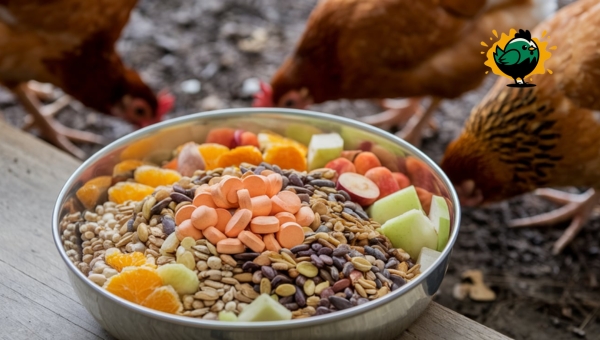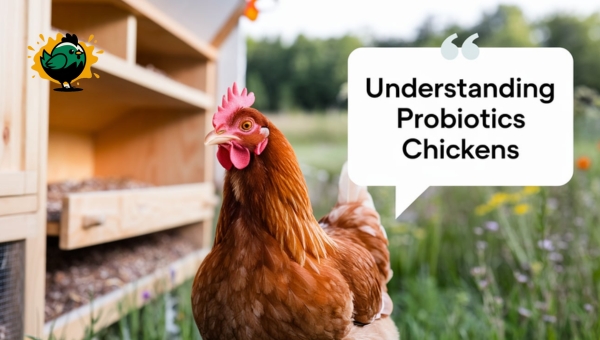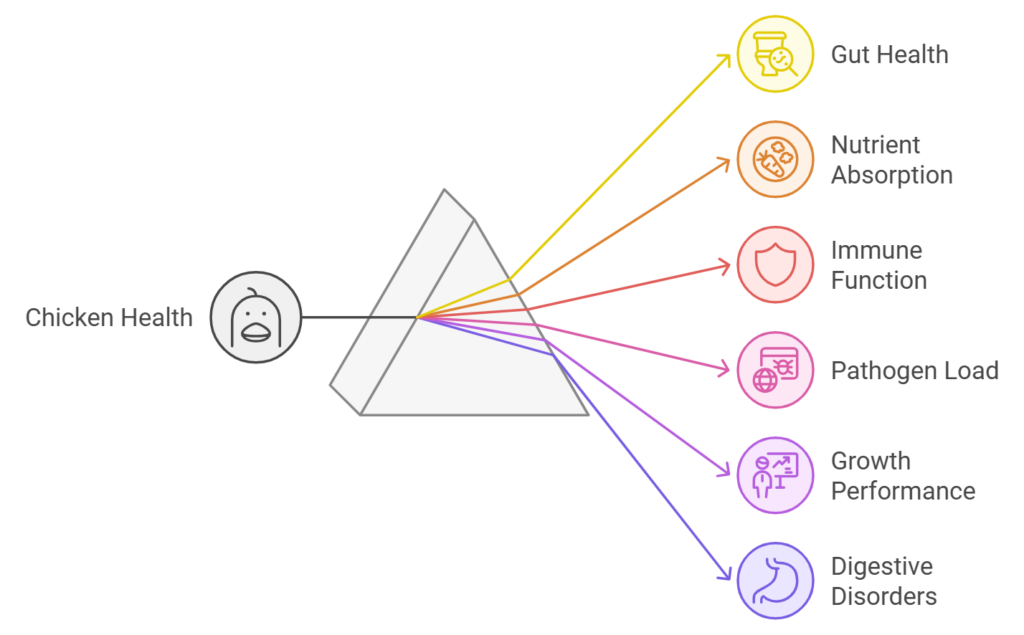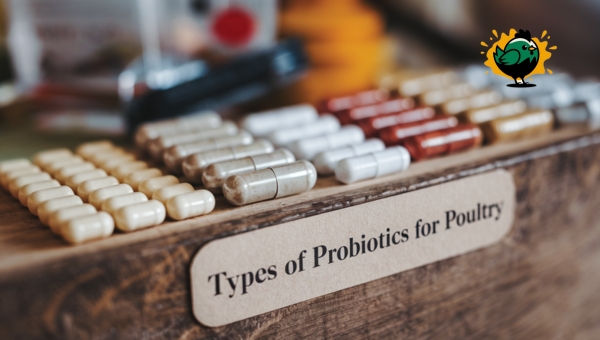Probiotics for Chickens – Boost Your Flock’s Health

A bustling farm, the sun rising over fields where chickens roam freely. These feathery creatures play a vital role in supplying fresh eggs and meat. But what if there’s a secret ingredient that can enhance their well-being and productivity? Enter probiotics for chickens. These tiny but mighty allies can transform the way your flock thrives.
By supporting gut health and boosting immunity, probiotics ensure your chickens stay healthy and strong. This article will unveil the benefits, types, and how to choose the right probiotics for your birds. Let’s dive into the world of probiotics and discover how they can revolutionize poultry management.
Understanding Probiotics
Probiotics are live microorganisms, such as beneficial bacteria and yeasts, that provide health advantages when consumed in adequate amounts. In poultry, they play a vital role in gut health. They help maintain a balanced intestinal flora, which is crucial for optimal nutrient absorption and immune function.

By establishing a healthy gut microbiota, probiotics can inhibit harmful bacteria like E. coli and Salmonella. This leads to improved digestive health and growth performance in chickens.
Incorporating probiotics into chicken diets is becoming an essential practice in modern poultry management, supporting both the well-being and productivity of the flock.
Benefits of Probiotics for Chickens
Probiotics offer numerous advantages that significantly enhance the health and productivity of chickens. By introducing beneficial microorganisms into their diets, poultry farmers can promote better gut health and overall well-being.

Here are some key benefits:
- Enhanced Gut Health: Probiotics support a balanced intestinal environment by promoting beneficial bacteria.
- Improved Nutrient Absorption: They aid in breaking down complex nutrients for better absorption.
- Boosted Immune Function: These supplements enhance the chicken’s immune response, offering protection against diseases.
- Reduced Pathogen Load: Probiotics help to suppress harmful bacteria in the gut, decreasing the risk of infections.
- Better Growth Performance: With regular use, chickens often show improved weight gain and feed efficiency.
- Alleviation of Digestive Disorders: Probiotics assist in managing issues like diarrhea and inflammation, contributing to overall poultry health.
Also Read: Egg Bound Chicken | Essential Guide to Prevention and Care
Types of Probiotics for Poultry
Probiotics play a pivotal role in poultry health, offering numerous benefits. These dietary supplements come in various forms, each with unique advantages.

We’ll explore two main types: bacterial and yeast-based probiotics. Both types contribute to the well-being of poultry but do so in slightly different ways.
Bacterial Probiotics
Bacterial probiotics are the most commonly used in poultry. They include beneficial strains such as:
- Lactobacillus: Enhances gut health by competing with harmful bacteria.
- Bifidobacterium: Supports digestive processes and nutrient absorption.
- Pediococcus: Strengthens the immune system and improves overall health.
These probiotics help maintain a healthy balance in the gut, aiding in the prevention of infections and promoting better growth.
Yeast-Based Probiotics
Yeast-based probiotics offer distinct benefits compared to bacterial types. They include:
- Saccharomyces cerevisiae: Known for binding pathogens and modulating immune responses.
- Enzyme Production: Yeast probiotics produce enzymes that enhance nutrient utilization.
- Unique Cell Wall Components: These components can bind harmful bacteria, preventing infections.
Yeast probiotics are particularly effective in improving digestion, making them a valuable addition to poultry diets.
How to Choose the Right Probiotic?
Choosing the right probiotic for chickens can seem challenging, but with the right information, it becomes manageable. It is essential to focus on specific factors that ensure the effectiveness of the probiotic.
Moreover, knowing some reputable brands can guide you in making the best choice for your poultry. Let’s explore these aspects to help you make informed decisions.
Factors to Consider
When selecting a probiotic for chickens, consider the following:
- Strain Specificity: Opt for strains that have been proven to benefit poultry.
- Survivability: Ensure the probiotic can survive the chicken’s digestive system.
- Formulation Type: Decide between single-strain or multi-strain formulations.
- Manufacturer Reputation: Choose brands known for quality and reliability.
Recommended Brands
Some popular brands that offer quality poultry probiotics include:
- PrimaLac: Known for its multiple beneficial strains aiding gut health.
- PoultryStar ME: A multi-strain probiotic celebrated for enhancing performance.
- Levucell SB: Recognized for its role in reducing Salmonella contamination.
These brands are well-regarded for their effectiveness in promoting chicken health and productivity.
Also Read: Can Chickens Eat Pumpkin? Find Out the Benefits and Tips!
How to Administer Probiotics to Chickens?
Administering probiotics to chickens can be done by incorporating them into their feed or water. Begin by following the dosage instructions provided on the product label. For younger birds, it’s advisable to introduce probiotics slowly to help them adapt without upsetting their digestive systems.
Consistency is key; integrate probiotics into daily feeding routines for the best results. It’s also important to observe the flock closely after administration to determine its effectiveness. Regular monitoring can help ensure that the chickens are benefiting from the probiotics, leading to a healthier, more productive flock.
Potential Risks and Side Effects
While probiotics for chickens are generally safe and beneficial, there are potential risks and side effects to keep in mind:
- Overgrowth of Certain Strains: Administering excessive amounts can lead to an imbalance, causing some strains to proliferate more than others.
- Allergic Reactions: Some chickens may experience sensitivity or allergic reactions to specific probiotic strains.
- Inconsistent Efficacy: Probiotic effectiveness can vary, and not every strain may work equally well across different flocks.
- Product Quality Variability: The quality and viability of probiotic products can differ significantly, affecting outcomes.
It’s advisable to select high-quality products and consult with a poultry expert or veterinarian to ensure safe and effective use of probiotics in your flock.
FAQs
How do probiotics benefit chickens?
Probiotics enhance gut health, leading to better nutrient absorption and immune function. They help inhibit harmful bacteria, improve growth performance, and reduce digestive disorders like diarrhea.
Are there different types of probiotics for chickens?
Yes, there are bacterial probiotics like Lactobacillus and yeast-based probiotics such as Saccharomyces cerevisiae. Each type offers specific benefits for poultry health and digestion.
How should probiotics be administered to chickens?
Probiotics can be mixed into feed or water. It’s important to follow dosage instructions and introduce them gradually, especially for young chicks, to ensure effective results.
Are there any risks associated with probiotics for chickens?
While generally safe, potential risks include overgrowth of certain strains and allergic reactions. Choosing high-quality products and consulting a veterinarian can help mitigate these risks.
Conclusion
Probiotics for chickens play a vital role in enhancing their health and productivity. They contribute significantly to maintaining gut health, boosting the immune system, and improving nutrient absorption.
This makes them an invaluable asset in modern poultry management. By selecting the right type and administering them correctly, poultry owners can ensure their flocks thrive.
While there are potential risks, careful consideration and consultation with a veterinarian can help mitigate these. Understanding and using probiotics effectively can lead to healthier, more productive chickens. For more insights into poultry care and management, explore our other informative articles on the site!
